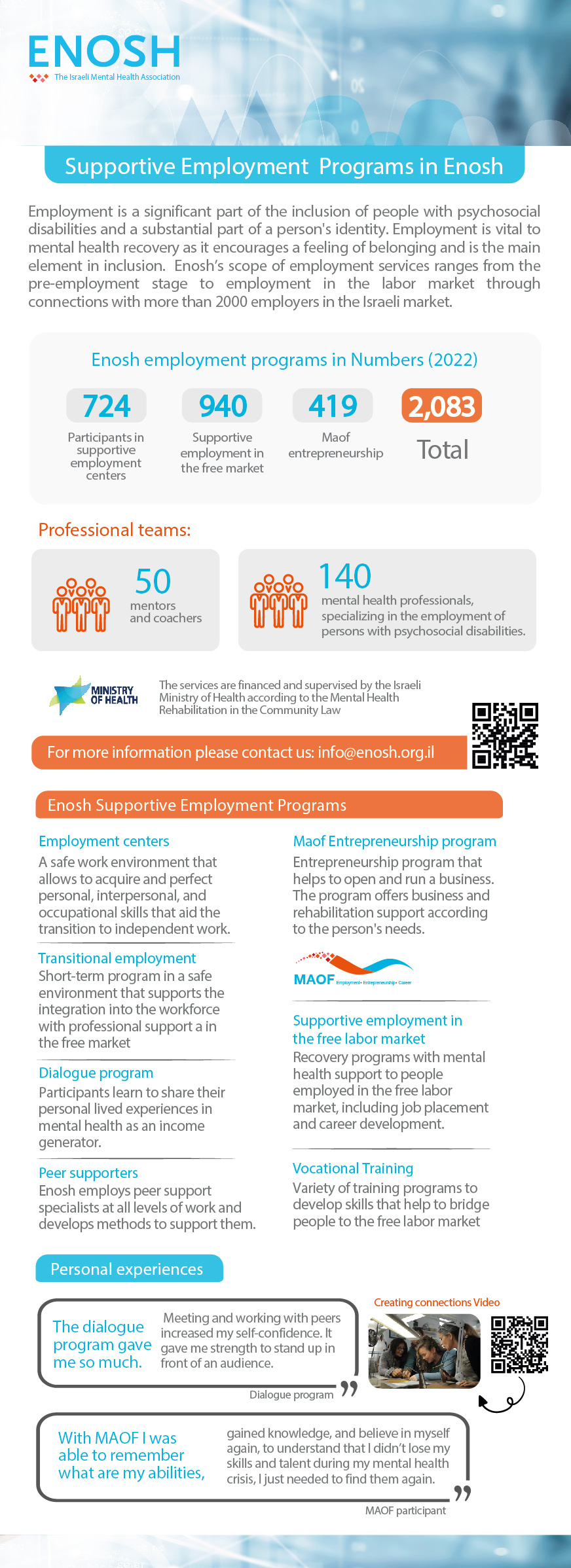Although people with mental illness represent the largest group among the disabled population, they are also the weakest and most marginalized due to social stigma. Thus, they experience challenges on multiple levels. On the one hand, they struggle with the symptoms and disabilities that result from their illness. On the other hand, they are confronted with stereotypes and prejudices that stem from misconceptions about mental illness. Consequently, people with psychosocial disabilities are denied opportunities that define a good quality of life: stability of employment, safe housing, adequate health care, and an affiliation with a supportive social network. Once individuals are labeled "mentally ill" and become aware of the related negative stereotypes, they experience rejection, devaluation, or discrimination.
The vicious cycle in which people with psychosocial disabilities find themselves caught involves self-stigma, unemployment, poverty, and reduced social networks – all threatening recovery and quality of life:
Social Support – People with psychosocial disabilities require support from peers, family, and friends to reduce their sense of isolation and increase their activity in the Community. Therefore, efforts to re-integrate them into society must be accompanied by actions implemented on the societal level.Enosh Supportive Employment Services
Enosh specializes in training for employment in the free labor market based on a rehabilitation approach. This approach is based on research and aims to improve professional skills, aid personal development and increase motivation. Participation in employment is a significant part of including people with psychosocial disabilities in society. It is a substantial part of a person's identity and is vital to recovery as it encourages a feeling of belonging. Work routines help to establish schedules and help improve income and quality of living. Through our program, we can promote the elimination of the social stigmas associated with mental illness as we see that the employment of people with psychosocial disabilities helps to reduce stigma. Enosh bridges the clients' individual needs to the demands of the common labor market. The scope of services ranges from the pre-employment stage to employment in the labor market.
Watch this international webinar "Inclusive Employment and Psychosocial Disability" at the Zero Project Conference, 2021 >
Please follow this link to watch a short video about the Ness-Ziona employment center >
Enosh Employment Programs
Employment Centers: Enosh offers pre-vocational training before working in the open labor market. The program allows participants to experiment in various occupations based on a tailored program that matches individual needs and abilities. The center's objective is to serve as a bridge to employment in the open job market. Accordingly, staff works with participants to instill basic work habits and enhance their self-confidence and social skills, enabling them to integrate into rehabilitative frameworks and the general workforce. The centers offer a variety of occupations to choose from, including producing handmade arts and crafts products, which are sold online on the open market, or pre-ordered by factories, etc. All proceeds go directly to our clients. Please visit the Enoshop website
Please follow this link to watch a short video about the Haifa employment Center and carpentry workshop >
Please follow this link to watch a short video about the Bat-Yam employment center >
Transitional Employment: Enosh runs several transitional employment programs in hotels, coffee shops, and supermarkets (e.g., Dan Hotels and Cafe Joe).
This one-year program prepares participants for optimal integration into the workforce. Services include assistance in finding a place of work and daily accompaniment by an employment facilitator at the site of employment.
Please follow this link to watch a short video about Egor's journey in the Hilton Hotels >
Training Centers: Enosh provides training for specific vocations and on-the-job experience while enhancing employment skills and feelings of competence. Two popular programs are our bicycle mechanics course and our culinary course. The Israeli Ministry of Health and The National Insurance Institute acknowledges the programs. These programs are offered at Enosh's Ramat Gan branch (the culinary program is also provided in other locations) and target highly motivated individuals who possess basic work skills yet require additional skill-building and direction for successful integration into the workforce. The program offers professional training and hands-on experience and sets individuals up with employment opportunities at the end of the training.
Please follow this link to watch a short video about the Ramat-Gan project >
Enosh Training programs were mentioned in the World Health Organization Guidance and technical packages on community mental health services (published in June 2021) https://rb.gy/4mxhyj
Supportive Employment in the Labor Market: This program coordinates with governmental organizations, placement agencies, and large businesses and supports participants working in the competitive market. It is not limited to a specific time frame. Participants who receive this service are placed in employment in the free market and receive ongoing guidance and support from the Enosh team before and after they are hired. Eligible participants undergo assessments and testing to determine their skills and abilities and are then placed in suitable positions according to their capabilities and aspirations. The Enosh team accompanies each participant and offers guidance and assistance to the employers, ensuring long-term and fruitful employment. Enosh develops tools and methods for full employment integration in the open labor market, focusing on the labor market's needs, developing professional skills, and narrowing technological gaps among those experiencing difficulty in their integration into employment.
Please follow this link to watch a short video about Christopher's story >
Maof Entrepreneurship Program: The Maof Program helps participants with entrepreneur qualities to establish a private business. This program supports individuals who wish to develop their own businesses. It combines business training, including specific guidance in the field of business that the entrepreneur is seeking to create and rehabilitative assistance.
Mentorship for participating entrepreneurs includes basic business management studies and business coaching. Business coaching includes developing a business plan, group meetings for sharing knowledge, simulations and forming business relationships, and mentorship in creating a private business. The project was founded by people with psychosocial disabilities based on their knowledge and passion for sharing their stories openly.
Read about Women-led businesses in MAOF >
Watch this international webinar, "Best practices to support the employment of persons with psychosocial disabilities." With MAOF participant Shmuly Daitch: https://fb.watch/eoSTtcTIjX/, with the WHO, ILO, and Israel Mission to Geneva 2022
Restart: The program, RESTART, aims to improve skills through a digital platform that provides ongoing feedback and helps participants prepare for the workplace environment. As part of this objective, we promote digital and technical skills and arrange for employment experience within the Community. This is a 4-month training program that includes professional and rehabilitation elements. We teach computer skills, offer simulation pieces of training through the digital platform, provide employment guidance and arrange a 3-month employment experience in various employment sectors along with the support of a professional rehabilitation employment counselor. We use unique technologies and applications that cater to real-life situations and are developed specifically for participants' needs.
Dialogue Project: The Dialogue Project is an occupational project that trains people with psychosocial disabilities to become lecturers. They share their personal stories in front of audiences, and the lectures become part of their ongoing occupation. The project promotes two goals: (1) Raising public awareness about psychosocial disabilities, community-based rehabilitation, and recovery, and (2) Increasing self-efficacy and self-confidence among the participants through repeated contact with audiences. The project is part of Enosh's groundbreaking program for business entrepreneurship development that was developed to enable psychosocial disabled people with entrepreneurial qualities to establish private businesses in an individual and a group framework. The individual framework includes an individualized rehabilitation plan, professional mentorship, and more.
Encounters with people who are undergoing recovery have a significant effect on eliminating stigma. The training course improves lecturing skills by giving and receiving feedback and gaining experience in the field. Specific skills include facing an audience and telling personal stories in different formats geared toward different audiences. Graduates are then given a platform to realize the skills they have acquired. According to research, recovery in mental health is a process of re-adapting one's attitudes, perceptions, and beliefs towards oneself, others, and life. As a recovery-focused service, the project emphasizes individual needs and strengths, encourages involvement and participation, and encourages independent choice and decision-making.
The project brings together people with psychosocial disabilities and individuals who may not have had the chance to hear live stories such as these. We find that it creates empathy among the audience members and nurtures the belief that people with psychosocial disabilities recover and should be welcomed into the Community. The project's impact is demonstrated through changing perceptions and attitudes of the general public and influencing the lecturers, who cope by sharing their stories and continuing to shape the stories along the way.
Ninety percent of the training participants graduated successfully. The participants regularly lecture in front of audiences (54% out of 28 training participants). The higher demand demonstrates the successful impact of lectures from various organizations. The project has established itself as a structured employment training course in which participants are provided tools and mentorship in one organized framework. The group support upon finishing the program provides a social framework in which peers can share experiences in a professional environment.


